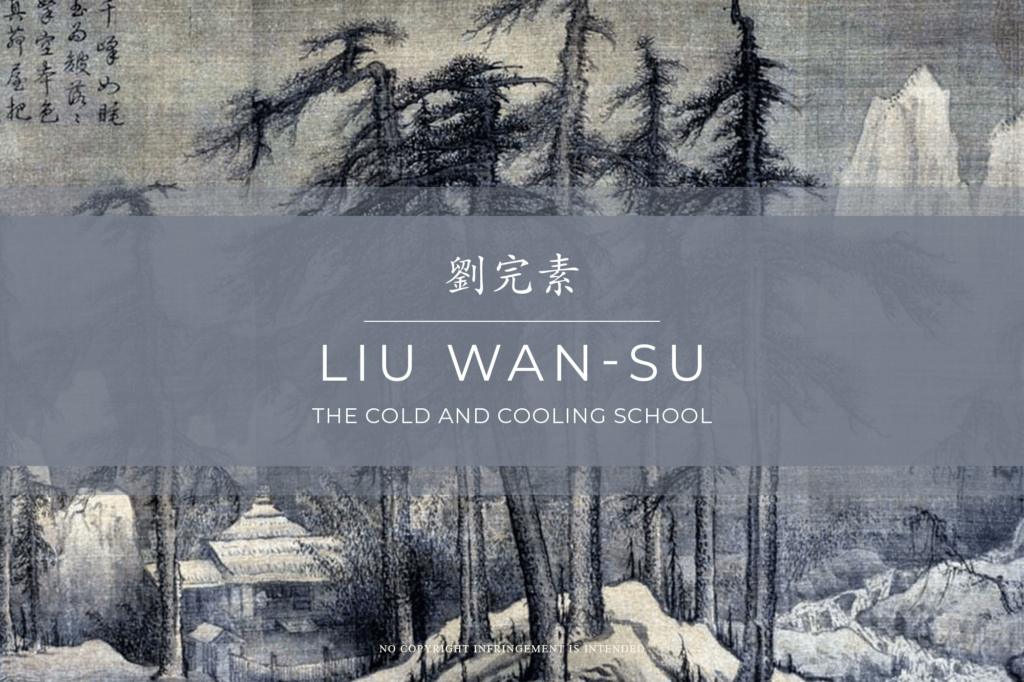
劉完素 Liu Wan Su lived from 1110–1200 and is revered as one of the Four Great Masters of Chinese Medicine during the 金朝 Jin Dynasty (1115 – 1234). His name has been memorialized alongside 張志和 Zhang Zi He (School of Attacking and Purging), 李东垣 Li Dong Yuan (Earth School), and 朱丹溪 Zhu Dan Xi (Yin Nourishing School).
These Four Great Masters of Chinese Medicine shaped unique approaches to the causation, prevention and elimination of disease. All four were not afraid to challenge the existing medical framework. In doing so they innovated and brought forth revolutionary ideas and schools of thought, ushering in a renaissance of Chinese Medicine.
劉完素 Liu Wan Su was born into a poor family. As a young boy his mother tragically died after numerous attempts to provide medical treatment for her failed. In fact, there was not one local physician who would agree to visit the woman when she desperately required medical assistance. This influenced 劉完素 Liu Wan Su to immerse himself in the medical arts and sciences.
Deeply moved by his grief, 劉完素 Liu Wan Su undertook a detailed and rigorous study of the 黄帝内经 Huangdi Neijing, translated as the Inner Canon of the Yellow Emperor. After managing to acquire specialized medical knowledge and experience, 劉完素 Liu Wan Su’s attention fell primarily on febrile diseases.
“Witness and observe to become a sage”
劉完素 Liu Wan Su Tweet
At that time the medical community, lead by the Song Imperial Bureau of Medicine, focused on using herbs of warm nature. Instead 劉完素 Liu Wan Su promoted the use of medicinal herbs of a cool nature. He argued that because the body’s internal Qi is warm in nature, a pathogen entering the body would adjust to the internal Qi and acquire the same warmth as a result. Therefore, medicinal herbs of a cooling nature were preferential according to 劉完素 Liu Wan Su.
Doctor Liu Wan Su quickly became a master herbalist and even found his own school of thought known as the Cold and Cooling School. Some of the most popular herbal formulations that came from 劉完素 Liu Wan Su are Six to One Powder (Liu Yi San) and Powder to Benefit Vitality (Yi Yuan San). His Siler and Platycodon herbal formula (Fang Feng Tong Sheng San) is still highly popular in the medical community of both China and Japan.
When I was twenty-five I directed my aspirations to the Neijing. Day and night I never put the book aside. When I was nearly sixty I chanced to meet a celestial man, who gave me a beautiful wine to drink. I had only about a chestnut-hull’s full, but my face turned red as though I were drunk. After I awoke my eyes were perceptive and my mind keen; I had been greatly illuminated.
劉完素 Liu Wan Su Tweet
Though doctor Liu Wan Su believed and practiced the Cold and Cooling approach, he examined each case on an individual basis and modified his prescriptions in accordance with each case’s uniqueness, taking in consideration environmental influences, patients’ constitutions and symptoms.
Ice and snow of spring are beneficial to the pine and cedar but harmful to the willow.
劉完素 Liu Wan Su Tweet
劉完素 Liu Wan Su’s fame eventually attracted the attention of the imperial court prompting three invitations to come practice medicine at the court from the emperor himself. Yet, doctor Liu Wan Su chose and managed to keep his distance and continued practicing medicine in his local community while providing medical assistance to people from all walks of life.
Doctor Liu Wan Su shared his knowledge and expertise in written texts that continue to be referenced by the medical community around the globe even today. Some of his valuable works include: Exploration of the Mechanism of Illness Based on the Suwen (Suwen Xuanji Yuanbing Shi) and Discussion of Febrile Diseases (Shanghan Zhige).
劉完素 Liu Wan Su was also proficient in both the Buddhism and Daoism and never stopped encouraging and inspiring his patients to seek self-cultivation and self-discovery as a means to enlightenment and enrichment, not just individual but also collective.